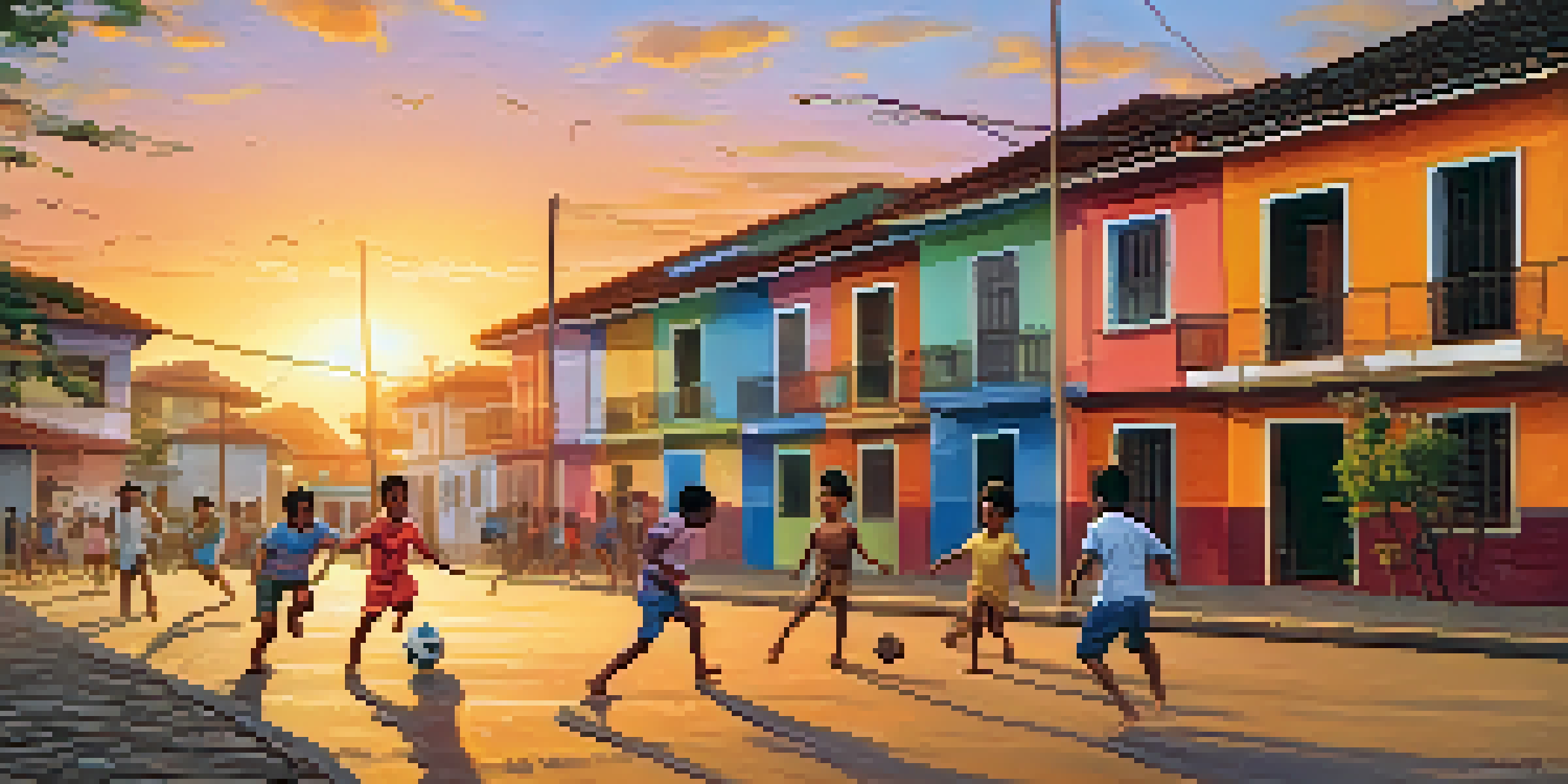A Guide to Brazil's Football Culture and Major Tournaments

The Heart and Soul of Brazilian Football Culture
Brazilian football is more than just a sport; it's a way of life. The passion for the game runs deep in the hearts of Brazilians, often transcending generations. From the streets to the stadiums, football brings communities together, creating a vibrant atmosphere filled with energy and excitement.
Football is a game of the people, and in Brazil, it is a way of life.
Children can be seen playing football in every neighborhood, using makeshift goals and any object as a ball. This grassroots love for the game nurtures talent and draws attention to the next generation of players who may one day represent Brazil on the world stage. The communal spirit showcased during matches highlights the deep-rooted connection many Brazilians have with football.
Whether it’s a casual game on the beach or a high-stakes match in the Maracanã Stadium, the enthusiasm is palpable. Celebrations, chants, and even rivalries contribute to a unique culture that defines not only football in Brazil but also the identity of its people.
The Role of Football in Social Identity
In Brazil, football often serves as a reflection of social identity and cultural diversity. Supporters identify with their local clubs, which are often tied to specific neighborhoods or regions, creating a sense of belonging. This connection goes beyond the pitch; it influences social status and community pride.

Clubs like Flamengo and Palmeiras have storied histories, allowing fans to express their loyalty and passion. Matches between rival teams can evoke intense emotions and highlight broader social issues, revealing the complexities of Brazilian society. For many, supporting a team becomes a crucial part of their identity.
Football: A Cultural Cornerstone
In Brazil, football transcends the sport itself, serving as a vital expression of community and identity.
The rituals surrounding football – from wearing team jerseys to gathering for match days – strengthen bonds within communities. Football becomes a celebration of culture, allowing fans to unite, express their pride, and share their experiences, regardless of their social background.
Major Domestic Tournaments: A Showcase of Talent
Brazil is home to several major domestic tournaments that showcase the country's footballing talent. The Campeonato Brasileiro Série A, often referred to as the Brasileirão, is the top tier of Brazilian football and features intense competition among clubs. Each season, fans eagerly follow their teams, hoping for the glory of becoming champions.
The ball is round, the game lasts 90 minutes, and everything else is just theory.
Another significant tournament is the Copa do Brasil, which allows clubs from different states to compete, creating thrilling matchups. This knockout-style competition often leads to unexpected surprises, as lower-tier teams can face off against giants, adding to the excitement and unpredictability of Brazilian football.
These domestic tournaments not only highlight emerging talents but also serve as a platform for clubs to secure their place in international competitions. The passion surrounding these events captivates millions, making them a fundamental part of Brazil's football culture.
The Iconic Brazilian National Team: A Source of Pride
The Brazilian national football team, known as Seleção, embodies the nation's pride and ambition. With a rich history that includes five World Cup victories, the team has become a symbol of excellence in football. Fans rally behind the Seleção during major tournaments, showcasing their unwavering support and enthusiasm.
Brazil's unique style of play, often referred to as 'samba football,' is characterized by skill, flair, and creativity. This approach not only wins matches but also captures the hearts of fans worldwide, making Brazil a perennial favorite in international competitions. The players are celebrated like heroes, with many becoming global icons.
National Pride in the Seleção
The Brazilian national team, known as Seleção, represents the country's footballing excellence and unites fans in national pride.
The connection between the national team and its supporters is profound, especially during World Cup seasons. The country unites in celebration, with streets filled with fans donning yellow and green, eagerly anticipating each match. This sense of collective pride is a testament to the power of football in Brazil.
Historic World Cup Moments That Define Brazil
Brazil's history in the FIFA World Cup is filled with unforgettable moments that continue to define its football legacy. From Pelé's stunning performances in the 1958 and 1962 tournaments to the emotional victory in 1994, these events have etched themselves into the hearts of fans. Each World Cup serves as a canvas for Brazil to showcase its talent and passion on the global stage.
One of the most iconic matches took place in 1970 when Brazil defeated Italy in the final, showcasing a team filled with legends. This victory solidified Brazil's status as a football powerhouse and inspired generations of players and fans alike. The artistry displayed by the team in this tournament is still celebrated today.
As Brazil prepares for each World Cup, the weight of history and expectation looms large. The memories of past triumphs and the desire to reclaim glory fuel the nation's passion for the sport, creating an atmosphere of excitement and anticipation that is truly unique.
Women’s Football in Brazil: Growing Recognition and Support
Women’s football in Brazil has seen significant growth and recognition in recent years, challenging traditional norms and stereotypes. With increasing support from fans and organizations, female athletes are breaking barriers and gaining visibility in a sport historically dominated by men. This shift is vital for the future of football in Brazil and serves to inspire young girls across the country.
The Brazilian women’s national team has made strides on the international stage, featuring talented players like Marta, who is celebrated as one of the best female footballers in history. Their achievements in tournaments such as the FIFA Women’s World Cup have raised awareness and inspired a new generation of female players eager to follow in their footsteps.
Women’s Football on the Rise
Women's football in Brazil is gaining recognition and support, challenging traditional norms and inspiring future generations.
Despite the challenges, the enthusiasm for women’s football continues to grow, with clubs investing in women’s leagues and grassroots programs. This positive trend not only elevates the status of women's football but also contributes to broader discussions about equality and representation within sports.
The Future of Football in Brazil: Challenges and Opportunities
As Brazil looks to the future, the landscape of football is evolving, presenting both challenges and opportunities. Issues such as financial disparities among clubs and the need for improved infrastructure are pressing concerns that need addressing. However, the passion for the game remains a powerful driving force for change.
Emerging technologies and analytics are beginning to play a role in how clubs develop talent and strategize for success. By embracing innovation, Brazilian football can continue to enhance its reputation and maintain its competitive edge on both domestic and international stages.

Ultimately, the future of football in Brazil hinges on its ability to adapt while preserving the rich cultural heritage that makes it unique. The love for the game, intertwined with the aspirations of players and fans alike, will undoubtedly shape the next chapter of Brazilian football.